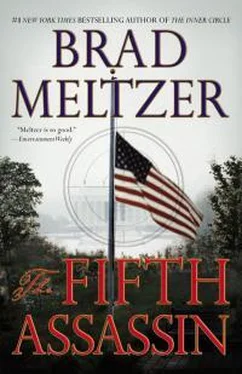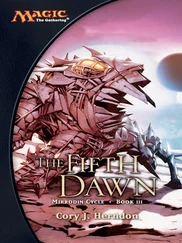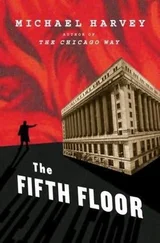He’s crushing my larynx—!
My knees collapse. My eyes flood with involuntary tears. But I still see him. The melted-wax face. Those gold eyes.
Marshall’s trying to kill me.
31
Staring down at his eelskin wallet, Dr. Palmiotti knew better than this. He did. But a few minutes ago, as he left Wok ’n Roll and stood out in the cold—amid the back-from-lunch rush crowd—he couldn’t help but watch A.J. walk up the block, back to work.
Back to 16th Street. Back to the White House.
For two minutes, Palmiotti stood there, knowing it shouldn’t matter. But it did.
And so there he was, staring down at his eelskin wallet. Or to be more precise, at the fortune from the fortune cookie that was sticking out of that little secret hiding space that, if he were thirty years younger, he would’ve used to hide a condom. It was the hiding space that you can only get to if you dig at it with your pointer- and middle fingers, which Palmiotti quickly did to pull out the paper fortune.
It wasn’t the contents of the fortune that mattered. It was what was written on back.
Two months ago, after A.J. helped him send that text during the funeral, as they were putting his new identity together, Wallace took the little scrap from a fortune cookie and wrote a ten-digit number on it. The President told Palmiotti that if anything went wrong… if there was an emergency and Palmiotti needed to talk… even if he just needed a friend… this was the number he should dial. A number that would connect him directly to the President.
Palmiotti knew what that meant. The public was told that Wallace carried a BlackBerry. It wasn’t a BlackBerry. Neither was Obama’s or any other President’s. It was a Sectéra Edge, a phone made specially by General Dynamics solely for the use of the President. The one phone Wallace carried himself.
So you won’t be alone , Wallace had promised. I’m always a phone call away.
For two months, Palmiotti had never used the number. Didn’t even think of it.
Okay, that wasn’t true.
He thought of using it during the very first week, when he was watching the Michigan game, which brought back memories of their college years. Then he thought of using it again, later that same week, when he was out for a walk and saw a dog that reminded him of the beagle Wallace had when they were young.
But Palmiotti wasn’t dumb. And he wasn’t shallow enough to break the emergency glass and place a direct call to the President of the United States simply because he was feeling homesick.
Yes, Palmiotti had known it wouldn’t be easy to just walk away from his life. But in those moments of doubt, he’d think back to what his mentor used to tell him twenty years ago when he was doing his cardiac residency: The bleeding always stops—one way or another. It was good advice. True advice. And when the advice didn’t make him feel any better, Palmiotti would close his eyes and inevitably start making a list of all the other people he now wanted to speak to, including his kids.
But as Palmiotti knew, whether he was alive or dead, his kids didn’t want to speak to him. He hadn’t even seen them in over a decade. Not since the divorce. Not after what he put them all through.
It was the same with his ex-wife. That’s why she was an ex.
Of course, it was different with his girlfriend, Lydia, which is why, on that one night a few weeks back, he (with aid from a far too expensive bottle of scotch) dialed her home number just to hear her voice. When she picked up, he hung up. That was all he needed.
After that, Palmiotti was strong. Committed.
Just like he was when it came to dealing with Beecher. After his conversation with A.J., he knew what the next steps were. He knew how to make it happen. And he knew it would only work if he made it work. But still… as A.J. disappeared around the corner and Palmiotti looked down at his eelskin wallet and the phone number scribbled on the paper fortune…
Orson Wallace wasn’t just his best friend. They were brothers. How can you separate brothers? Hesitating, Palmiotti told himself to wait. That he’d be seeing Wallace soon—like A.J. said, at the Presidents’ Day event…
Still.
With everything Palmiotti had sacrificed, would one phone call—just a few seconds… a few sentences to say hello—really hurt?
Studying the phone number, Palmiotti replayed his mentor’s words: The bleeding always stops—one way or another. That was absolutely right.
But as he also learned in med school, there was actually a faster way to stop the bleeding: when you take matters into your own hands.
Pulling out the cheap disposable phone that he’d switch every few weeks, Palmiotti looked down at the fortune cookie and dialed the ten-digit number.
As it rang, he knew, on some level, that the President would be pissed. But once he and his friend started talking, it’d all go back to normal. That’s what friends do.
In Palmiotti’s ear, the phone rang once… twice…
His shoulders lifted at the sheer excitement of reconnecting. Sure, Wallace would be mad, but he’d also—
“ We’re sorry ,” a female mechanical voice eventually answered. “ The number you dialed is not in service. Please check the number and dial again. ”
Palmiotti felt a hot, sudden throb in the wound that was healing in his neck. For a moment, he thought he must’ve dialed the wrong number.
But as the mechanical woman repeated herself… even before he checked the paper fortune… before he redialed… Stewart Palmiotti knew he’d dialed exactly right.
32
Marshall doesn’t say anything.
He holds tight to my throat, still clutching my Adam’s apple.
I fight to break free, but my eyes feel like they’re about to pop.
Without a word, he loosens his grip, though not by much. My lungs refill with air and I unleash a hacking cough. But Marshall doesn’t let go. Not completely.
He looks me dead in the eye. His bumpy, burned hand is still on my throat, holding me in place. “If you’re not careful who you follow, you will get hurt,” he says, making sure I hear every syllable.
He finally lets go, letting me catch my breath. “What the hell is wrong with you?”
He doesn’t answer.
As I look around—at the silver pots and pans hanging from the ceiling… the industrial stoves and ovens on my left… plus the stainless steel prep areas with the chefs and waiters…
“Why’re we in a restaurant kitchen?” I blurt as I finally place the smell in the air. Fresh pasta.
Marshall looks over his shoulder. At first, I assume he’s worried about being heard. He’s not.
“What’re you guys doing?” a heavy chef with a thin gray beard blurts, looking up from a tray of pastries he’s filling.
“Mind your business,” Marshall barks back, marching through the kitchen, past the rolling prep carts, and heading for the swinging doors at the far end. His tone is so commanding, the chef doesn’t even push back at the intrusion. But I see how quickly the chef looks away. It’s hard to stare at Marshall’s burned face.
With a shove of the swinging door, the fluorescent lights and stainless steel of the kitchen give way to the muted yellow walls, French doors, and plush décor of a fine Italian restaurant.
A few stragglers from the lunch crowd—all of them in suit and tie—turn and stare. It happens in every posh restaurant in D.C.—people checking to see if we’re anyone famous. But again, after one look at Marshall’s face, they all turn away. What I’m starting to notice, though, is I think that’s how Marshall prefers it.
Sticking to the corner, by the bar, he scans the restaurant. On my right, a stack of menus finally tells me where we are. Café Milano.
Читать дальше











